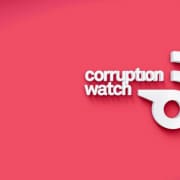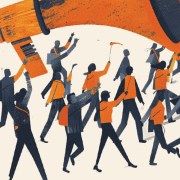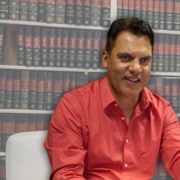|
Getting your Trinity Audio player ready...
|
On this day a decade ago, Corruption Watch (CW) was launched. It has been a time of change in many ways, and a series of ups and downs just like any other entity existing in South Africa, but a number of original staffers are still here, and they and those who came after are as committed to their work as they were back then.
“It’s an incredible accomplishment for a small organisation like ours in such a hostile and difficult environment to have clocked 10 years of existence with no intention of slowing down,” says our new executive director Karam Singh. “Sadly we are still counting the costs and casualties of a decade of state capture.”
The fact that CW’s cause and approach is as relevant today as it was 10 years ago is testament to conflicting circumstances, Singh adds. “On the one hand is the dedication and drive of the team behind CW. On the other is the continuing challenging corruption dilemma we are up against. Congratulations on this milestone go to all the staff and leadership over the years who have dedicated their professional lives to the fight against corruption.”
“Since opening our doors in January 2012, our overriding objective has been to build an active and informed public voice opposed to corruption,” comments founding executive director David Lewis, who deftly steered the organisation through the first decade of its existence. “And so we have used our research, our investigations, our community outreach, all to build an informed voice against corruption, and we have worked with the media, and used our own media as well, to communicate our public position on corruption.”
Ten years later, the country still grapples with serious corruption, adds Lewis. “But unlike many other countries that have a serious corruption problem, we have a population that has not accepted that corruption is a way of life. We have a public who is still vocally opposed to corruption and who will punish, as we have seen, any political party that doesn’t itself express an equally strong opposition to corruption. And this is what has saved us from sinking to the depths of a Russia or India.”
We need to maintain that opposition, he says. “Long may Corruption Watch and other civil society organisations and the media continue to oppose corruption with the zeal and with the energy that they have opposed it in the past, because that truly will be our saviour.”
CW is driven as much by the dedication of its staff as by the whistle-blowers who have shared their stories with us, and we are deeply grateful to the latter – over 35 000 of them. We don’t have the capacity to individually help each and every one – a fact that we’ve made plain all along – but we use their information to detect corruption hotspots, to develop targeted campaigns, to contribute to policy- and legislation-making, and to put pressure on government to make changes that will benefit all and not just a select few. So in the end we aim to help not only the person who came to us, but others who are in the same position.
Though we’ve had to adapt our working methods to the circumstances of Covid-19, our message and our mandate remain the same, and we still have our work cut out for us – more so with the numerous disturbing revelations that have bombarded us in recent years.
Read our article from 10 years ago, introducing the nation to our new civil society organisation.
Government, civil society welcome Corruption Watch launch
By Corruption Watch 26 Jan 2012, 10:34
The launch, held at the Women’s Gaol at Constitution Hill in Johannesburg, was attended by a range of government, civil society and business leaders, including Jay Naidoo, Mark Haywood, Mary Metcalfe and Njongonkulu Ndungane, as well as a large contingent of news media.
“We will not succeed in our quest to defeat this fast-advancing enemy unless we can successfully mobilise and empower ordinary people, strengthen and build a people-centred developmental state, led by honest men and women, build independent state institutions that battle against corruption daily and transform the judiciary and media,” he said.
As the launch kicked off, City Press editor Ferial Haffajee tweeted: “#corruptionwatch 100’s of people crowded into a jail on a Thursday morning to fight corruption. You’ve got to love our DNA – I do.”
New York Times Johannesburg bureau chief Lydia Polgreen added: “Emergence of watchdogs from close allies of the ANC a sign of South Africa’s maturing democracy? Civil society blossoming. #CorruptionWatch.”
Daily Maverick journalist Sipho Hlongwane said: “From the sound of it, #CorruptionWatch should be an invaluable data mining tool. People will have to use it a lot, obviously.”
“By gathering, interpreting and acting on information from the public, the media and other sources, Corruption Watch will expose the corrupt and the misuse in particular of public money,” said Corruption Watch director David Lewis. “We have formed this organisation to enable citizens to report and confront public and private sector individuals abusing their power and position.”
The data collected by the organisation will be used to reveal hotspots of corrupt activity around the country at municipal, provincial and national level. Where corruption is rife, Corruption Watch will seek partnerships with powerful organs of civil society to effect change.
Funded principally by donations from charitable foundations, Corruption Watch was initiated as a non-profit organisation by Cosatu’s office bearers, who were receiving an increasing number of complaints about corruption from its membership and the general public. Its board of directors is made up of Bobby Godsell, Adila Hassim, David Lewis, Mary Metcalfe, Mavuso Msimang, Njongonkulu Ndungane, Kate O’Regan, Zwelinzima Vavi, with Vuyiseka Dubula in the chair.
Through social media, people can share their stories about all manner of corruption, including but not exclusive to bribery, kickbacks and graft; influence peddling and patronage; and corruption in the work place where they’ve witnessed or been victims of favouritism, nepotism, ghost workers and illegitimate absenteeism. People may be able to report instances of bid-rigging, price-fixing, arbitrage and profiteering, cartels and collusion and tender and procurement irregularities.
“Information from crowd-sourcing offers a clear understanding of what is happening on the ground,” said Lewis. “While we won’t be in a position to investigate each and every report, the combined knowledge of people coming to our site will provide us with a powerful tool to build alliances with other institutions and NGOs. Strengthening the scale and voice of civil society will help South Africans defeat corruption.”
“Our first campaign,” said Lewis, “is asking people to sign a pledge online, or via SMS, refusing to participate in corruption and, if they are civil servants, committing to treating public resources with respect.”








